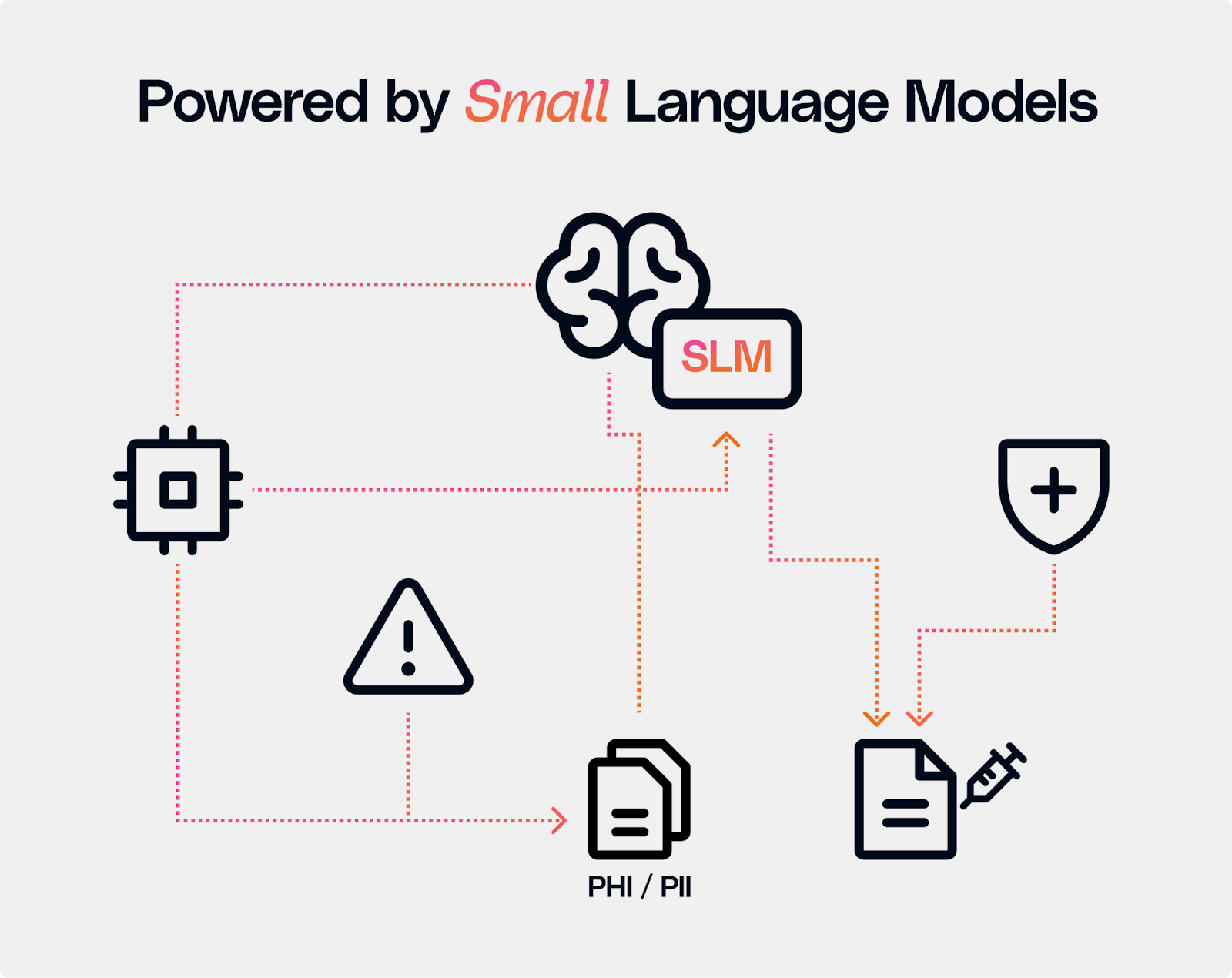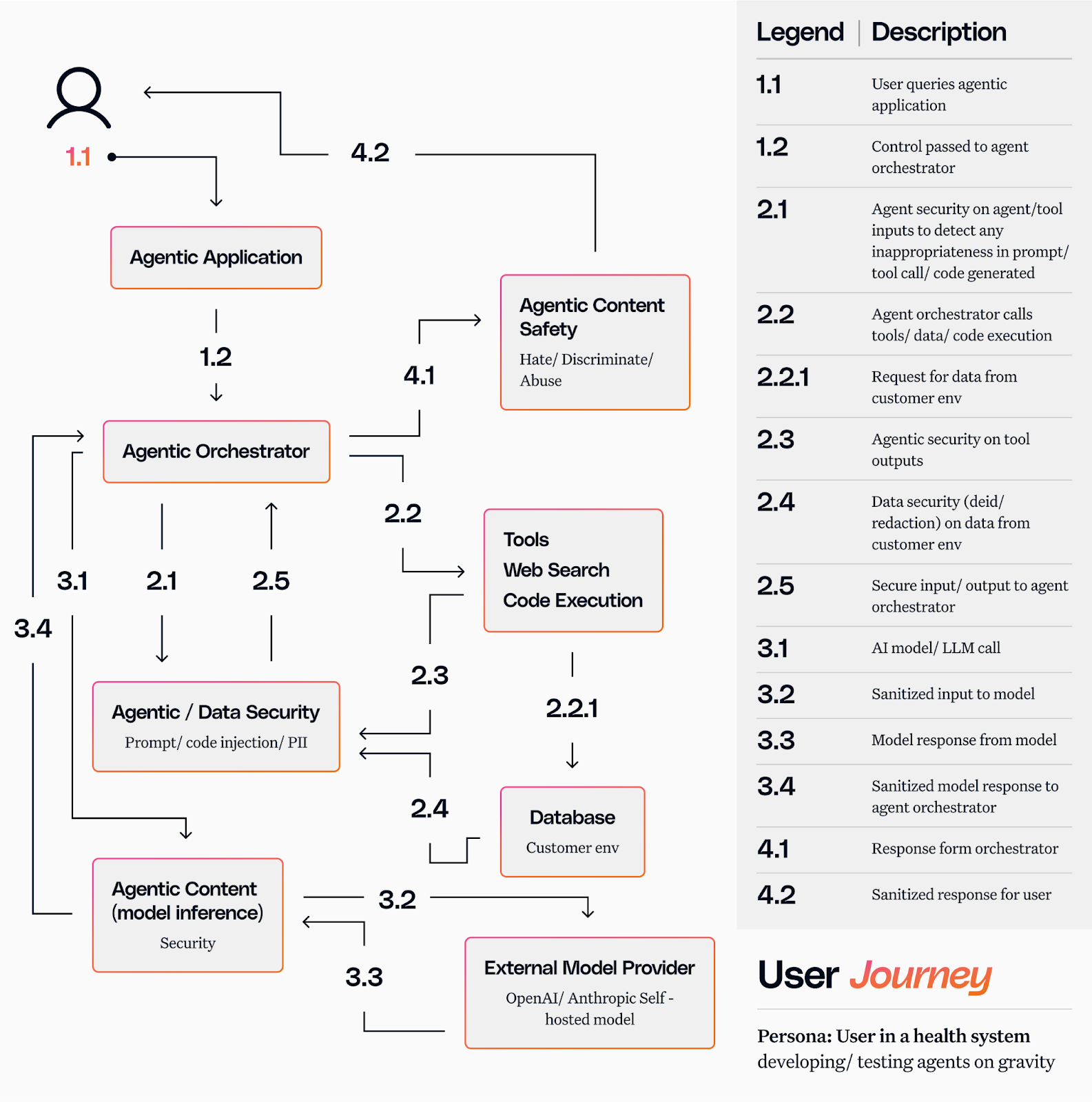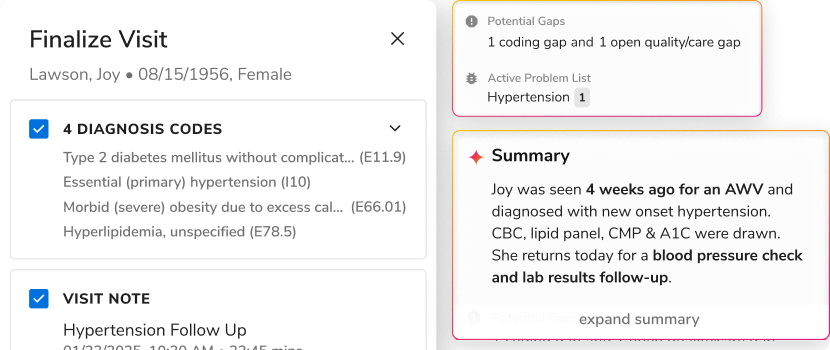Defense-in-Depth: Gravity’s Multi-Layered Protection


At Innovaccer, we believe that trust is the foundation of AI adoption. Just as cloud computing requires new models of protection, AI demands a new kind of security architecture that protects not only infrastructure and data, but also the content and interactions AI systems generate. Building on our Gravity Platform which enables healthcare organizations to securely harness the power of AI, we developed Gravity Shield, a solution designed to extend zero-trust principles to AI systems and their interactions.
Gravity Shield is our integrated framework for securing AI applications and products at scale. It combines proven enterprise security practices with AI-native safeguards to help organizations innovate with confidence. From preventing adversarial attacks to ensuring compliance, Gravity Shield is designed to provide resilience at every layer.
A Layered Approach to Security

Gravity Shield is structured around six interconnected layers that together create a comprehensive defense-in-depth model. Each layer protects customers in a specific way, providing the assurance that risks are mitigated before they impact business operations.
Application & Product Security
Healthcare entities depend on seamless, safe patient experiences. Gravity Shield ensures this with perimeter defenses, strong identification & authentication mechanisms, authorization controls and secure session management. For healthcare systems, this means that patient portals, scheduling tools, and digital records remain protected against unauthorized access.
AI Agent Content Safety
AI systems generate content that directly impacts clinical decision-making and patient trust. Gravity Shield addresses this by filtering out bias, misinformation, toxicity and self-harm content. It provides topic blockers to prevent inaccurate clinical intervention advice and ensures resilience against data poisoning and model theft. For healthcare customers, this translates into AI-driven care assistants or triage systems that remain compliant, safe, and reliable and always aligned with clinical and ethical standards.
AI Agent Security
The way patients and clinicians interact with AI also creates new attack surfaces for adversarial actors. Gravity Shield protects against prompt injection, jailbreaks, obfuscation, malicious roleplay and code injection. It safeguards systems from denial-of-service attempts via prompt length and leverages continuous red teaming to harden defenses. For Accountable Care Organizations (ACO) deploying AI-enabled communication tools, this ensures that malicious actors cannot manipulate agents to produce misleading medical advice or expose protected health information (PHI).
Data Security
Patient data is the most sensitive asset healthcare organizations hold. Gravity Shield secures this data through de-identification, redaction, masking, and encryption. While training AI models, privacy preserving methods ensure PHI can never be exposed by the model while backup and retention controls guarantee availability. For healthcare organizations, this means AI can improve care delivery without ever compromising HIPAA obligations or patient trust.
Compliance Security
Meeting compliance requirements is critical for healthcare trust and adoption. Gravity Shield incorporates HIPAA, HITRUST, SOC2, BAA, and ISO27001 by design. For healthcare systems or regional ACO networks, this simplifies regulatory alignment, ensuring that compliance is baked into every deployment rather than added as an afterthought.
Infrastructure & Network Security
Healthcare networks are large, distributed, and often highly interconnected. Gravity Shield strengthens this foundation with network segmentation, IP restrictions, daily scanning, and CI/CD pipeline security. For customers running EHR-integrated AI applications, this ensures that the infrastructure remains resilient and that security risks are addressed before they disrupt clinical workflows.
Observability by Design
A critical cross-functional pillar of Gravity Shield is Observability. Healthcare leaders need visibility into how safe and reliable their AI agents are while making decisions and assisting clinicians and patients. Gravity Shield delivers this through:
- Tracing and monitoring for explainability across AI systems.
- Audit logs for accountability during compliance reviews or breach investigations.
- Real-time blocking and alerting to mitigate threats instantly before they affect clinicians or patients.
This gives healthcare organizations confidence that Gravity Shield is continuously and actively defending their systems, patients and clinicians.
Powered by Small Language Models
At the core of Gravity Shield are Small Language Models (SLMs) purpose-built for the unique demands of healthcare AI security and safety. Unlike large general-purpose models, these SLMs are optimized to detect and mitigate risks such as prompt injection, policy violations, PHI/PII leakage, and harmful content generation. They act as specialized safeguards, embedding content safety, redaction, and compliance enforcement directly into the security layers. Each SLM is trained on carefully curated and diverse datasets that blend corrected public datasets, synthetic data and proprietary or custom data, delivering both accuracy and adaptability. As a result, the models achieve high precision with low false positive and false negative rates, ensuring that clinicians and administrators are alerted only when necessary. They are lightweight, with low-latency performance and smaller deployment sizes that make them practical across environments ranging from on-premise data centers to edge devices in clinical settings. Built with flexibility in mind, Gravity Shield’s SLMs can run on CPUs or GPUs, are easy for customers to fine-tune for their unique workflows, and remain context-aware to support a variety of downstream tasks. For healthcare organizations, this means AI that is not only powerful and compliant, but also secure, efficient and adaptable to the fast-changing landscape of patient care and regulation.

How Healthcare Customers will use Gravity Shield
Healthcare entities like providers, payors and ACOs rely on Gravity Shield to:
- Protect patient interactions: Ensuring AI assistants, scheduling bots and care triage systems provide accurate and safe recommendations without harmful or biased outputs.
- Defend against evolving threats: Preventing adversarial attacks that could leak PHI, alter clinical advice, or damage institutional reputation.
- Simplify compliance: Embedding HIPAA and HITRUST alignment into AI deployments, reducing the burden on compliance teams and speeding up innovation.
- Enable safe innovation: Allowing clinical and operations teams to roll out AI features confidently, knowing that security and privacy guardrails are always in place.
- Prevent unauthorized access: Ensure AI agents and co-pilots don't access data sources, apps and patient portals without appropriate permissions.
- Privacy-preserving training: Allowing health systems to train their own AI models in a secure and private manner.
For example, an ACO deploying AI-driven virtual care assistants can use Gravity Shield to prevent prompt injection attacks, redact PHI automatically, maintain HIPAA compliance, and trace every interaction with detailed audit logs, all while keeping patient trust intact.
A sample journey of a user in a health system developing and testing agents on Gravity with security integrated in the workflow would look like this as shown below.

Why It Matters
AI is a transformational technology in healthcare. From accelerating diagnosis to streamlining patient engagement, it has the potential to reshape care delivery. But for it to scale responsibly, healthcare organizations must address the unique risks it brings. Gravity Shield is our answer to this challenge: a framework that not only protects systems and patient data, but also builds trust with providers, regulators, and patients.
Security can no longer be bolted separately, it is a core enabler of adoption. With Gravity Shield, healthcare entities like ACOs can innovate faster, scale responsibly and lead confidently in the age of AI-driven medicine.
Gravity Shield is how we are rethinking healthcare security for the AI era, layered, transparent, patient-focused and built for scale.

.png)





.png)









.svg)
.svg)

.svg)

